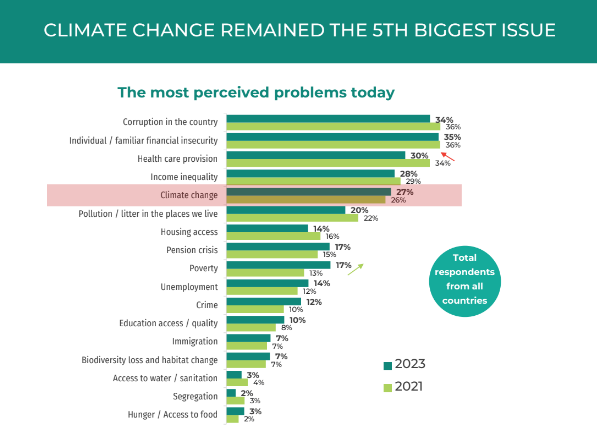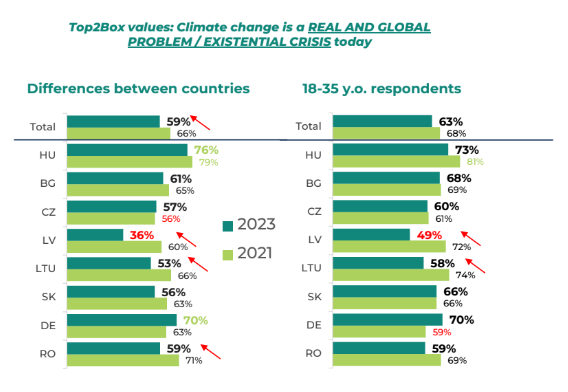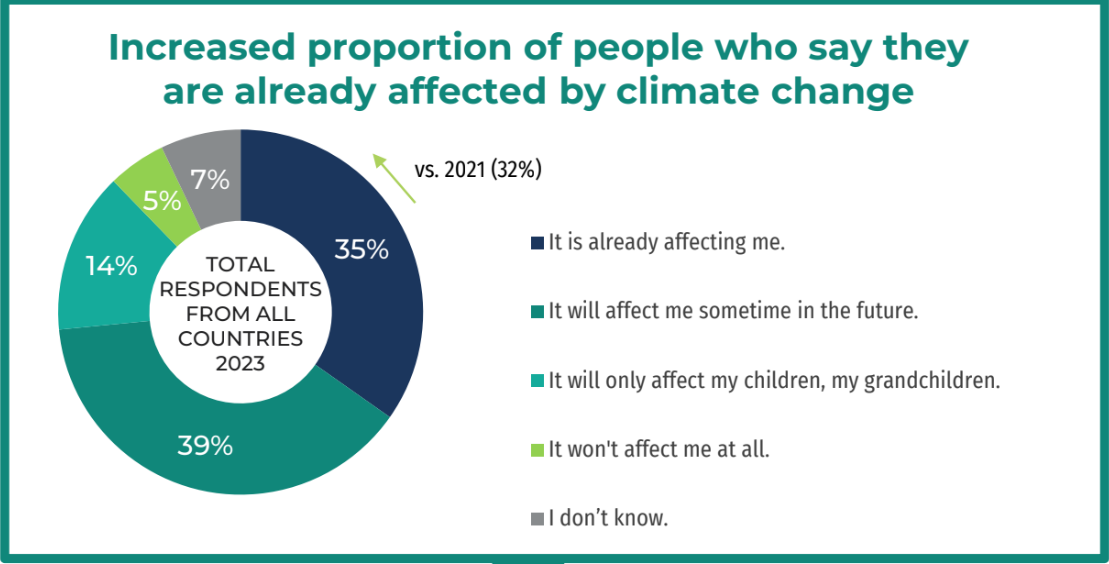The science is clear. The world is warming dangerously, humans are the cause of it, and a failure to act today will deeply affect the future of the Earth. Global warming is happening, and its effects are being felt around the world. The warmest year on record was 2023.
We planned to conduct a second survey in 2023 with the cooperation of CEEWeb, our lead partner organization, focusing on how climate change impacts all life on Earth and how our choices affect the ecosystems in order to capitalize on the strong synergies in an emotional, life-centered communication campaign. The evaluation of the survey was compared with the results of the 2021 survey to see how the understanding of the public, and especially the young (18-35 years old) generation, has changed after about one and a half years. The aim of the ‘Game Over?’ project is to support the multi-dimensional and cross-country campaign of CEEWEb for Biodiversity with identifying the most appropriate messages and channels for communication actions.
What we found? Our responders in 2023 think that climate change remains the 5th biggest issue among the most perceived problems in the world.

Two years ago, I was more optimistic that we might still have time... Today I think we are running out of time.’ (LT, female, 31)
One of our responders has a strong opinion. But there is a big difference between the countries we found.
Significant decrease in the proportion of people who consider climate change a real and global problem. Apart from Germany, the proportion of people in all the countries surveyed who consider climate change to be a real, global problem has stagnated or even fallen - but Hungary is still the best performer.

Based on the focus group discussions, the overall level of involvement and perceived importance of the topic among young people is the same or even higher versus 2021, amplified by recently experienced extreme weather conditions (flood, warm winter, summer heatwaves, weather rapidly changing) in Europe, but diminished by the worsening financial situation of individuals, high level of disappointment and the feeling of being powerless.
For most of the statements, the results for 2023 show a similar picture to the survey 2 years earlier, with still the largest number of respondents - nearly two thirds - recognising the need for immediate and real action to avoid the negative impacts of climate change.
However, significantly more people think this year that the media exaggerates the news about climate change, and similarly, significantly more people think now that climate change only affects poorer people. On the latter two issues, Romanian respondents are the most strongly opinionated.
Natural disasters remain the biggest fear of climate change
Among the countries surveyed, Hungary was the only country where extreme and unpredictable weather conditions (rather than an increase in natural disasters) ranked first.
In Slovakia, the fear of a decline in natural resources and ecosystem services is much higher than average. This fear is even more pronounced in the 18-35 age group. An increased proportion of people who say they are already affected by climate change.

No source more credible than scientists / professionals
...disaster photos, look at what is happening in Italy. But they do not write about the reasons.’ (HU, female, 33)
‘Social media, I no longer use, because that has pulled me down psychologically so much, you just get hit with so much shit there...’ (GER, male, 22)
There is a lot of competing and conflicting information out there about the environment and climate change. We found that more and more people think that the media is exaggerating the information. Even though TV and news portals are generally trusted, credibility issues have come up more strongly in 2023; trust in the mass media is overall decreased because of fake news, distortions, superficial, polarizing and negative content. It is especially apparent in the Czech Republic, where a higher sensitivity to the credibility of information was reported due to disinformation campaigns, a growing scene which denies climate change, and more negative news on the topic – for instance by portraying the extreme action of the environmental activists – was found; and in Germany, where the willingness to consume information has decreased, people feel that they are flooded with negative information and polarizing discussions.
We found out that credible information, whether from TV or online portals, is when it is provided by a scientist. The results have not changed in this respect since 2021.
How do we get information?
There are incredible reliable sources of information from the scientific community, here are a few examples:
The Intergovernmental Panel on Climate Change (IPCC)
World Meteorological Organisation (WMO)
Raising awareness and the role of the media is extremely important in 2023. Educational institutions (and teaching children from an early age, probably starting in kindergarten) and the media were constantly listed as playing the main role. But we found an important tendency. Similarly to the findings in 2021, respondents do not tend to proactively look for information on climate change in 2023, either - however, they come across related information less frequently, as in most of the countries involved in the research the topic of climate change has been sidelined.
The vast majority still has a clear preference to online sources of information, especially online news portals, as they are evaluated as credible. Social media (FB, TikTok, Instagram) was also mentioned but their perceived level of credibility is much lower. Short videos are said to be more efficient than longer documentaries.
- Why does the younger generation in 2023 feel disappointed, skeptical and pessimistic about climate change?
- How do women and men feel about climate change? Are there any differences between the genders?
- What actions do I need to do against climate change? Is what I do important?
- Who is responsible?
- And how we can raise awareness and what is the role of the media?
Those are the questions we discuss further in our blog series.
If you want to know when the new blog article will be published, or get more news about the topic sign up to our newsletter here.
If you are interested in the whole survey, you can find it here.




